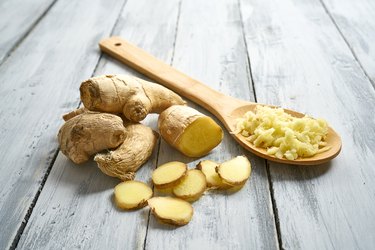
A mainstay of Asian cuisine, ginger is celebrated for its healing effects. Used to treat inflammation, chronic pain and nausea, ginger provides an alkalizing effect on the body and can reduce acid reflux. Eating more alkaline foods might benefit bone health and improve cardiovascular health.
Tip
Ginger is alkaline and might help relieve the symptoms of acid reflux. This natural remedy can also aid in reducing inflammation.
Video of the Day
Ginger Helps Acid Reflux
Your body tightly regulates pH level — the balance between acidity and alkalinity — to maintain homeostasis. According to the International Food Information Council Foundation (IFICF), on the pH scale, zero to seven represents acid compounds and seven to 14 represents basic alkaline compounds. Fruits, vegetables (like raw ginger) and nuts are considered alkaline foods.
Video of the Day
Proponents of an alkaline diet say you shouldn't eat acid compounds because of their negative health effects on the body. However, the IFICF says that following an alkaline diet won't have a big effect on the overall pH of your body. Rather, you should eat alkaline foods simply because they are healthy for you.
But if you do want to combat the pain acid compounds can sometimes bring to your digestive tract, incorporating alkaline foods like ginger can help. For those with occasional acid reflux disease — a disorder that occurs when stomach acid flows back into the tube from your mouth to your stomach — Harvard Health Publishing says that the root of the ginger plant can act as a digestive aid.
To eat, you can peel the raw ginger and then grate or dice this root vegetable to add to your cooking. You can also steep the grated raw ginger in water for tea.
Ginger Health Benefits
Rich in medicinal benefits, ginger can help with the following:
Inflammation. In a July 2016 study from PharmaNutrition, the authors state that ginger and its extracts have long been used as anti-inflammatory remedies and can help prevent chronic joint inflammation and other inflammatory disorders such as arthritis.
Pain. In a May 2015 systematic review from Nutrition Journal, researchers found that members of the Zingiberacea family, which includes ginger and Javanese ginger, serve as clinically effective pain agents. They can even reduce chronic pain just as well as non-steroidal anti-inflammatory drugs, and don't have the same renal risks associated with these type of drugs.
Bone health. Ginger is often used as part of a natural treatment program for patients of osteoporosis. This helps them support their body in the process of self-healing, rather than relying on pain medications, according to a May to August 2015 study from Clinical Cases in Mineral and Bone Metabolism.
Nausea. Pregnant people and those undergoing chemotherapy might want to add raw ginger to their diet, as various preclinical and clinical studies evaluated ginger to be an effective and safe treatment for nausea and vomiting, according to a March 2016 study from Integrative Medicine Insights. The researchers also found that ginger was deemed safe for human consumption and that raw, fresh ginger contained the second highest quantity of gingerol-related compounds (the active property of ginger), just behind dried ginger powder.
Oncolink from the University of Pennsylvania says that raw ginger is the preferred form for consumption, but you should watch your intake. You shouldn't eat more than 4 grams of raw ginger per day, which is the equivalent of 1 tablespoon. Overeating this root vegetable can exacerbate your health ailments.
- PharmaNutrition: “Anti-Inflammatory Effects of the Essential Oils of Ginger (Zingiber officinale Roscoe) in Experimental Rheumatoid Arthritis”
- International Food Information Council Foundation: “A 'Basic' Examination of the Alkaline Diet”
- Harvard Health Publishing: “What is GERD or Gastroesophageal Reflux Disease”
- Nutrition Journal: “Zingiberaceae Extracts for Pain: a Systematic Review and Meta-Analysis”
- Clinical Cases in Mineral and Bone Metabolism: “The Natural Approach to Osteoporosis”
- Integrative Medicine Insights: “The Effectiveness of Ginger in the Prevention of Nausea and Vomiting during Pregnancy and Chemotherapy”
- Oncolink: "Ginger: Health Benefits and Dietary Recommendations During Cancer Treatment"